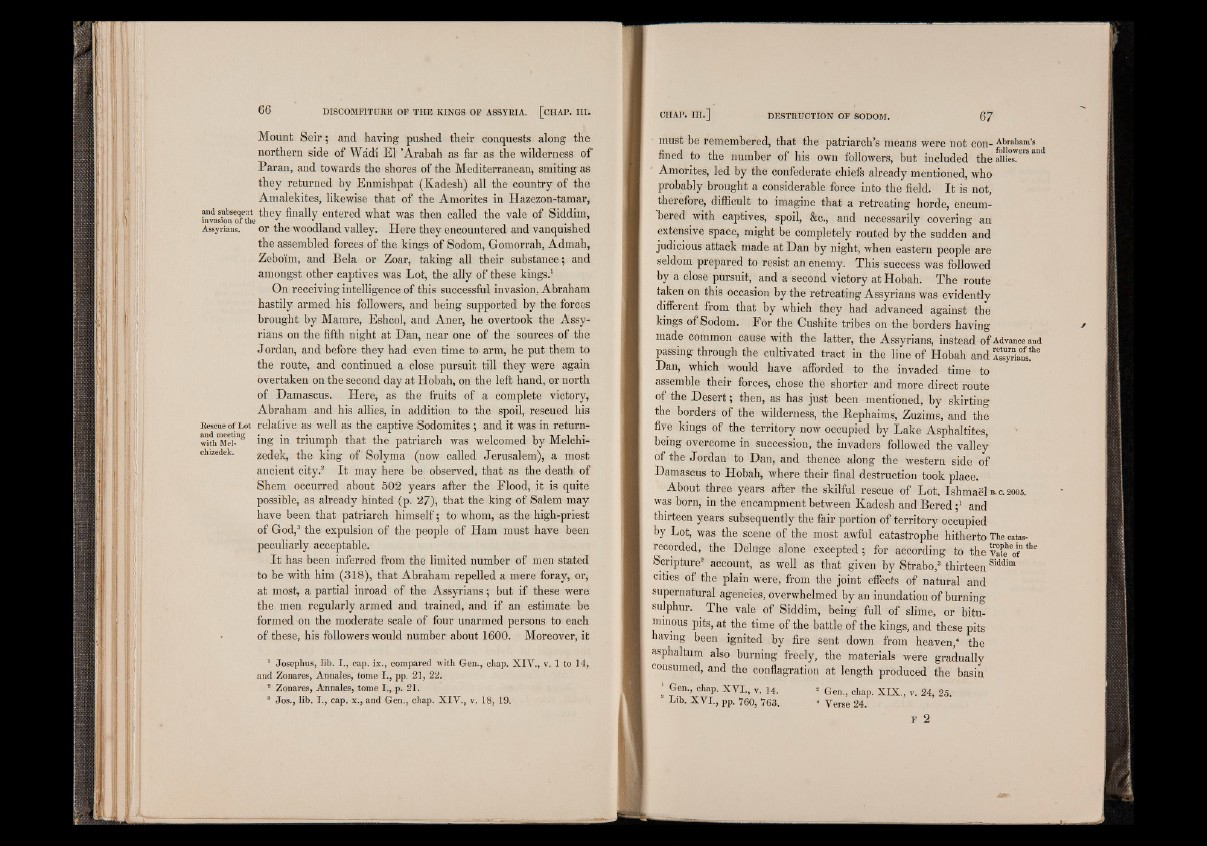
Mount Seir; and having pushed their conquests along the
northern side of Wadi El ’Arabah as far as the wilderness of
Paran, and towards the shores of the Mediterranean, smiting as
they returned by Enmishpat (Kadesh) all the country of the
Amalekites, likewise that of the Amorites in Hazezon-tamar,
and snbseqent they finally entered what was then called the vale of Siddim,
invasion of the * ^ * 1 1
Assyrians. or the woodland valley. Here they encountered and vanquished
the assembled forces of the kings of Sodom, Gomorrah, Admah,
Zebo'im, and Bela or Zoar, taking all their substance; and
amongst other captives was Lot, the ally of these kings.1
On receiving intelligence of this successful invasion, Abraham
hastily armed his followers, and being supported by the forces
brought by Mamre, Eshcol, and Aner, he overtook the Assyrians
on the fifth night at Dan, near one of the sources of the
Jordan, and before they had even time to arm, he put them to
the route, and continued a close pursuit till they were again
overtaken on the second day at Hobah, on the left hand, or north
of Damascus. Here, as the fruits of a complete victory,
Abraham and his allies, in addition to the spoil, rescued his
Rescue o f Lot relative as well as the captive Sodomites; and it was in returnwRhMe!”
8 ing in triumph that the patriarch was welcomed by Melchichizedek.
zcdek, the king of Solyma (now called Jerusalem), a most
ancient city.2 It may here be observed, that as the death of
Shem occurred about 502 years after the Flood, it is quite
possible, as already hinted (p. 27), that the king of Salem may
have been that patriarch himself; to whom, as the high-priest
of God,3 the expulsion of the people of Ham must have been
peculiarly acceptable.
It has been inferred from the limited number of men stated
to be with him (318), that Abraham repelled a mere foray, or,
at most, a partial inroad of the Assyrians; but if these were
the men regularly armed and trained, and if an estimate be
formed on the moderate scale of four unarmed persons to each
of these, his followers would number about 1600. Moreover, it
1 Josephus, lib. I., cap. ix., compared with Gen., chap. X IV ., v. 1 to 14,
and Zonares, Annales, tome I., pp. 21, 22.
2 Zonares, Annales, tome I., p. 21.
8 Jos., lib. I., cap. x., and Gen., chap. X IV ., v. 18, 19.
must be remembered, that the patriarch’s means were not con- Abraham’s
fined to the number of his own followers, but included the aiiieSWere “
| Amorites, led by the confederate chiefs already mentioned, who
probably brought a considerable force into the field. It is not,
therefore, difficult to imagine that a retreating horde, encumbered
with captives, spoil, &e., and necessarily covering an
extensive space, might be completely routed by the sudden and
judicious attack made at Dan by night, when eastern people are
seldom prepared to resist an enemy. This success was followed
by a close pursuit, and a second victory at Hobah. The route
taken on this occasion by the retreating Assyrians was evidently
different from that by which they had advanced against the
kings of Sodom. For the Cushite tribes on the borders having
made common cause with the latter, the Assyrians, instead of Advance and
passing through the cultivated tract in the line of Hobah and As^km!116
Dan, which would have afforded to the invaded time to
assemble their forces, chose the shorter and more direct route
of the Desert; then, as has just been mentioned, by skirting
the borders of the wilderness, the Bephaims, Zuzims, and the
five kings of the territory now occupied by Lake Asphaltites,
being overcome in succession, the invaders followed the valley
of the Jordan to Dan, and thence along the western side of
Damascus to Hobah, where their final destruction took place.
About three years after the skilful rescue of Lot, Ishmael B.c.2005.
was born, in the encampment between Kadesh and Bered and
thirteen years subsequently the fair portion of territory occupied
by Lot, was the scene of the most awful catastrophe hitherto The catas-
recorded, the Deluge alone excepted; for according to the Vafe Vf” the
Scripture2 account, as well as that given by Strabo,3 thirteenSiddim
cities of the plain were, from the joint effects of natural and
supernatural agencies, overwhelmed by an inundation of burning
sulphur. The vale of Siddim, being full of slime, or bituminous
pits, at the time of the battle of the kings, and these pits
having been ignited by fire sent down from heaven,4 the
asphaltum also burning freely, the materials were gradually
consumed, and the conflagration at length produced the basin
1 Gen., chap. X V I., v. 14. * Gen., chap. X IX ., v. 24, 25.
Lib. X V I., pp. 760, 763. 4 Verse 24.
F 2